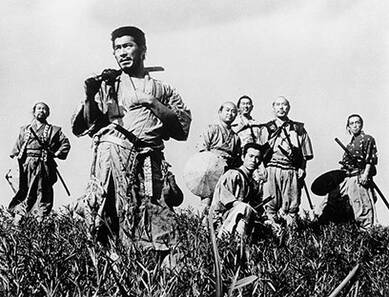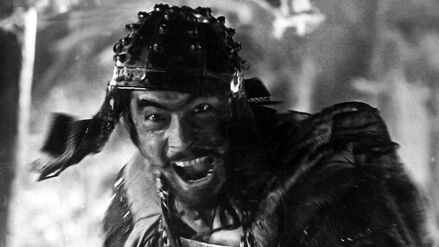A | Poor villagers recruit a septet of warriors to protect them from bandits. Directed by Akira Kurosawa Starring Toshiro Mifune, Takashi Shimura, and Isao Kimura Review by Jon Kissel |

With Seven Samurai, the problem of a classic film seeming tired because it’s been imitated so many times is solved by its bedrock quality as a fun and meaningful work, doubly impressive in how it holds attention throughout its epic length. I doubt that the first team was assembled onscreen in 1954, but Seven Samurai seems to get the credit for bringing this trope to the masses. Of course, clichés are clichés because they work, a saying that is itself a cliché. Having already seen both versions of The Magnificent Seven, I had a general idea what to expect with Seven Samurai: villagers in danger recruit men to help protect them against a larger force, and the two disparate groups learn from each other on the way to a costly victory. I made guesses at the beginning about who would survive to the end (I went one for three), and I imagined the plot structure in my head (did better on this front). None of that stopped me from enjoying the film moment to moment.
For being such a well-known story, Seven Samurai contains a lot of cultural specificity that made, and makes, it better than its elemental parts. Westerners take a lot for granted after being fed cultural messages for so long, and it’s easy to forget that other cultures don’t share them. For example, the idea of the respectable yeoman farmer is deeply ingrained in America, but for feudal Japan, the farmer’s at or near the bottom of the social hierarchy, a serf with little control over control of their life thanks to the competing mercies of nature or marauding bandits. The soldier class is higher up, but even when they take on a mission, they’re expected to be brutal and cruel to everyone around them as everyone just assumes that violence can’t be cordoned off into one corner of a person’s behavior. The conception of firearms could not be more drastically different, as it’s the equivalent of a sword for Americans but is viewed as cowardly in Seven Samurai. These aren’t openly remarked upon in the film, but it’s difficult to imagine that translating across the Pacific, such that those and other cultural assumptions are cleaned up for the American remakes.
If farmers, soldiers, and guns aren’t what Seven Samurai values, what it does hold sacred is a level of empathy one wouldn’t expect in the prototypical action film. The stereotypes of honor and Bushido don’t play a big factor here, as we’re introduced to group leader Shimada (Takashi Shimura) as he’s cutting off his valued top knot and bushwhacking a bandit under false pretenses. The default position is of ruthlessness. There’s no big Western-style faceoff against incredible odds, just tactics that peel off lone riders from the larger group, thus making them smaller and more manageable. The strategy that this is all done for is a noble act of resistance against the world as it is. Shimada takes the job out of pity for the villagers, and he convinces the others to join by simply presenting them the facts: no money, room and board, and the implicit understanding that their actions will marginally improve things for everyone. An early quibble is that the team is assembled without much convincing, but an hour in, there’s enough world detail and Shimada is charismatic enough to make their acceptance plausible.

Kurosawa’s greatest contribution to cinema with Seven Samurai might be his grasp of what it means to be a great action film. A big part of that is coherence, as in understanding what the geographical stakes are whether you’re watching a single faceoff or a large-scale engagement. The film takes a lot of time drawing out the boundaries of the town, finding the entrances and understanding what their forces can and cannot defend. When the battle commences, those choke points are frequently referred to and maintained, and Shimada keeps a helpful tally of remaining bandits at the center of town. Kurosawa’s grasp of choreography extends to the comedic, as he uses the same kind of language to enact evergreen physical jokes that keep the film from taking itself too seriously. The man knows what he’s doing.
Another man who knows what he’s doing is Toshiro Mifune. In the seven of his performances I’ve seen so far, all with Kurosawa behind the camera, he often goes very big, especially here. He’s more restrained when he’s playing a character in contemporary Japan, so his wild acting in the medieval-set films is surely a choice coming from some kind of Japanese tradition. Every time I watch him when he’s in his gesticulating, face-contorting hamminess, I have to remind myself to wait him out because he’ll get to the good stuff. He very much does in Rashomon, and he does here as well. Kikuchiyo’s a great character, beloved by children, wiser than he lets on, and imperfect and wild to the end.
This is a great film deserving of its treasured status, though it’s not my favorite Kurosawa. Of the seven samurai, three don’t make an impression. It’s not like the film is wanting for time. What’s the difference between 207 minutes and 220 minutes, especially if that extra time is used to make important characters more memorable. That said, competing against masterpieces like Yojimbo, Rashomon, and personal favorite Ran in front, Seven Samurai shouldn’t feel bad about itself. Watching these kinds of classics can’t help but feel a bit like homework, and sometimes, it is. I watched a film by Kurosawa’s acclaimed colleague Yasujiro Ozu in theaters last fall, and humiliated myself by barking myself awake in a mostly-full theater. That was homework. This is a reminder that classics are classics for a reason. A-
 RSS Feed
RSS Feed